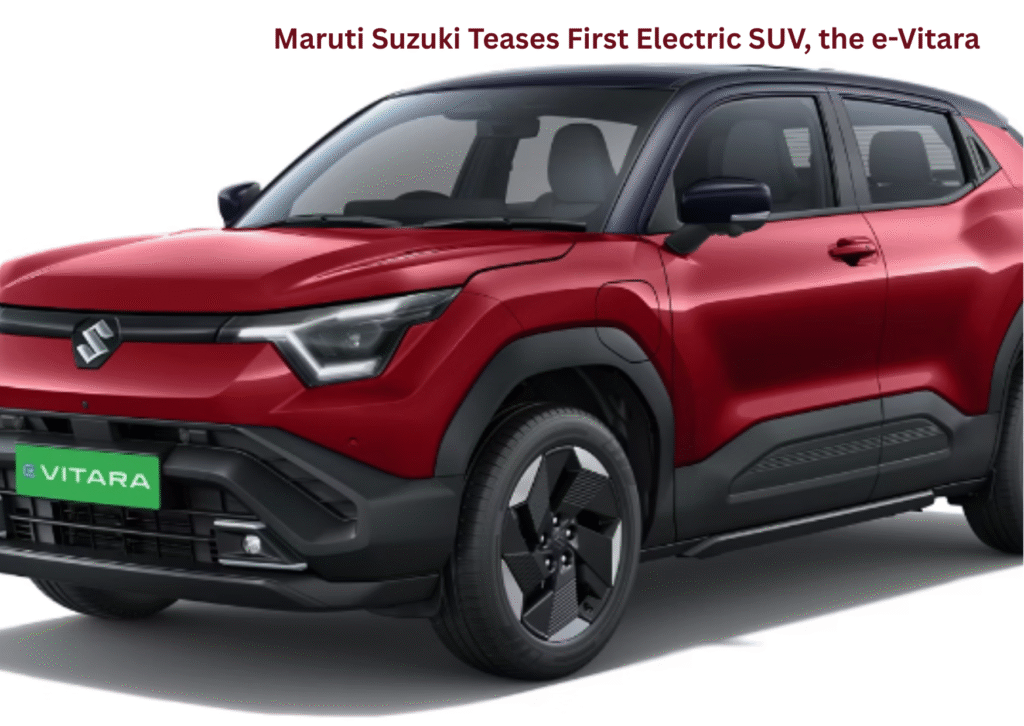Maruti Suzuki is determined to stay ahead of India’s rapidly intensifying electric vehicle revolution. The most talked-about feature of this SUV is already the upcoming Maruti Suzuki e-Vitara charging performance. After all, efficiency and speed of charging are just as important in an EV as price, comfort, and design. Will Maruti’s first worldwide electric SUV live up to the expectations? Let’s investigate every possibility
Table of Contents
Maruti Suzuki E Vitara Performance Details
An EV’s performance is determined by how smoothly power is delivered, not just by horsepower. Although the e-Vitara is anticipated to have between 135 and 150 horsepower, statistics don’t fully convey the picture. The instant torque is what makes electric SUVs enjoyable. The rush is instantaneous, smooth, and surprisingly addictive—imagine breaking out of a traffic signal in Bengaluru or passing on a hilly road close to Manali.
Regenerative braking, which restores some of the energy lost when you slow down in traffic, is another anticipated feature of the SUV. This improves the Maruti Suzuki e-Vitara charging performance in addition to extending its range, making it more practical for daily use.
Maruti Suzuki e-Vitara: Battery, Range and Charging
The e-Vitara establishes the practical framework for the battery pack. Industry insiders suggest a 50–55 kWh battery with a 400–450 km practical range. That is almost a week’s worth of commuting without a recharge for the majority of Indian drivers.
The SUV excels when it comes to charging flexibility. You can recharge it overnight at home using a standard AC charger, so it’s ready to go the following morning. However, DC fast charging is invaluable if you’re pressed for time. Long road trips will be much less stressful with the e-Vitara’s high-capacity charger, which can charge it from 20% to 80% in less than an hour.
| Year | Stat | Source |
| 2025 | 50–55 kWh battery pack | Industry Reports |
| 2025 | 400–450 km range | Autocar India |
| 2025 | 45–50 min fast charge (20–80%) | EV Research Data |
This dual charging system ensures that no matter how you drive—whether in stop-and-go city traffic or cruising on highways—the Maruti Suzuki e Vitara Charging Performance keeps up with your lifestyle.
Maruti Suzuki e-Vitara Expected Price

Affordability has always been one of Maruti’s greatest advantages. The eVitara is anticipated to retail for between ₹18 and ₹22 lakh, although many EVs currently fall squarely into the premium range. It will directly compete with the Hyundai Kona EV, MG ZS EV, and Tata Nexon EV at this price.
For middle-class Indian consumers who wish to switch to electric vehicles without going over budget, the Maruti Suzuki e-Vitara’s strong charging performance and affordable price could be a game-changer
Maruti Suzuki e-Vitara: Interior and Features
When you enter the e-Vitara, it’s clear that Maruti isn’t holding back. Expect a modern dashboard with integrated automotive technologies, a large touchscreen, and a digital instrument cluster. For those who are tech-savvy, voice commands, Android Auto, and Apple CarPlay will all be integrated.
Comfort will also be a primary concern. Features like a panoramic sunroof, wireless phone charging, ventilated seats, and clever storage spaces are likely to be included. Families, regular commuters, and young professionals will all find the cabin to be both opulent and practical.
Maruti Suzuki e-Vitara: Safety Features
Indian EV buyers now demand much more than just airbags and ABS. Six airbags, ABS with EBD, stability control, and hill-start assist are likely to be features that the e-Vitara has in abundance.
Advanced driver assistance systems (ADAS) like automatic emergency braking, adaptive cruise control, and lane departure warning are anticipated on higher variants. These safety features give you peace of mind about protecting your family, much like the Maruti Suzuki e-Vitara Charging Performance does when you’re traveling long distances
Maruti Suzuki e-Vitara Colours and Variants
Maruti understands Indian buyers love choice. The e-Vitara will likely arrive in multiple trims—base, mid, and top-spec—each offering different levels of tech and luxury.
Color options could include elegant pearl white, sporty metallic blue, graphite grey, and an eye-catching red-black dual tone. These variants won’t just add variety—they’ll let buyers pick a version that feels personal to them.
Maruti Suzuki e-Vitara Launch Date
When will it eventually be available for purchase? The majority of reports suggest that Maruti will launch in late 2025 or early 2026, though the company has not yet made an official announcement. The final reveal is imminent because prototypes have already been seen undergoing testing in India. The timing is absolutely crucial. Although there is fierce competition in the Indian EV market, Maruti may be able to outperform its rivals thanks to its strong Maruti Suzuki e-Vitara Charging Performance, service network, and brand trust
Maruti Suzuki e-Vitara Advanced Features
This is where a lot of people might be surprised by the SUV. The e-Vitara is anticipated to include advanced charging intelligence in addition to the standard tech features. Imagine an SUV that learns your driving patterns, recommends the best times to charge, and even uses real-time navigation to find the closest fast charger.
Your car can get smarter every month without going to a service center thanks to over-the-air (OTA) updates. Convenience will be further improved by AI-powered voice assistants and predictive range calculators.
| Feature | Benefit | Limitation |
| Fast Charging | 20–80% in 45–50 min | Relies on DC charger availability |
| Long Range | 400–450 km | Real-world range drops on hills |
| Smart Features | AI charging, OTA updates | Premium trims may cost more |
| Competitive Price | ₹18–22 lakh | Still above budget hatchbacks |
In short, advanced features aren’t just gimmicks—they complement the Maruti Suzuki e-Vitara charging performance, making ownership more practical and future-ready.
FAQs on Maruti Suzuki e-Vitara Charging Performance
Q1. What is the charging time of the Maruti Suzuki e-Vitara?
The Maruti Suzuki e-Vitara is expected to take 8–9 hours for a full charge using a standard home AC charger. With a DC fast charger, it can recharge from 20% to 80% in just 45–50 minutes.
Q2. What is the driving range of the Maruti Suzuki e-Vitara on a single charge?
Early reports suggest the e-Vitara will deliver a real-world range of 400–450 km, depending on driving conditions, terrain, and load.
Q3. How much will the Maruti Suzuki eVitara cost in India?
The SUV is expected to be priced between ₹18 and 22 lakh, making it a strong rival to the Tata Nexon EV, MG ZS EV, and Hyundai Kona EV.
Q4. When will the Maruti Suzuki eVitara launch in India?
The launch is expected around late 2025 or early 2026, with prototypes already being tested on Indian roads.
Q5. Does the Maruti Suzuki e-Vitara support fast charging?
Yes, the e-Vitara supports DC fast charging, which significantly boosts its practicality for long-distance travel by reducing downtime.
Q6. How does the Maruti Suzuki e-Vitara compare with rivals in terms of charging performance?
Thanks to its 50–55 kWh battery and 400–450 km range, combined with fast-charging capability, the e-Vitara is set to compete directly with the Tata Nexon EV and MG ZS EV while offering Maruti’s trusted service support.
Conclusion
Customers are excited for other reasons besides the Maruti Suzuki e-Vitara charging performance, which is turning out to be its best-selling feature. The e-Vitara may be India’s most useful electric SUV to date thanks to its roomy cabin, cutting-edge features, strong safety package, and anticipated price that undercuts competitors.
Overnight home charging will be simple for people who commute to the city every day. DC fast charging gives highway drivers peace of mind during lengthy trips. Mass adoption is inevitable when you factor in Maruti’s dependable service network.
As India races toward an electric future, the e-Vitara is not just another EV—it’s Maruti Suzuki’s bold step into a new era of mobility. If the company delivers on its promise, this SUV could redefine what Indians expect from an electric car.

Dattu Siddi is a Commerce graduate and automobile content writer with over 2 years of blogging experience. Based in Yellapur, Uttara Kannada (Karnataka), he focuses on delivering accurate, easy-to-understand car information using real-world calculations and practical comparisons. Through cardekho24, Dattu publishes clean, user-first automotive content—especially around EVs, budget cars, ownership costs, and real-life usage—to make car research simple, transparent, and trustworthy.